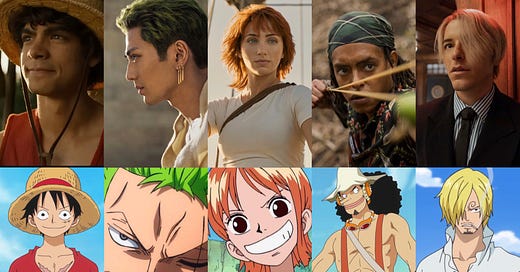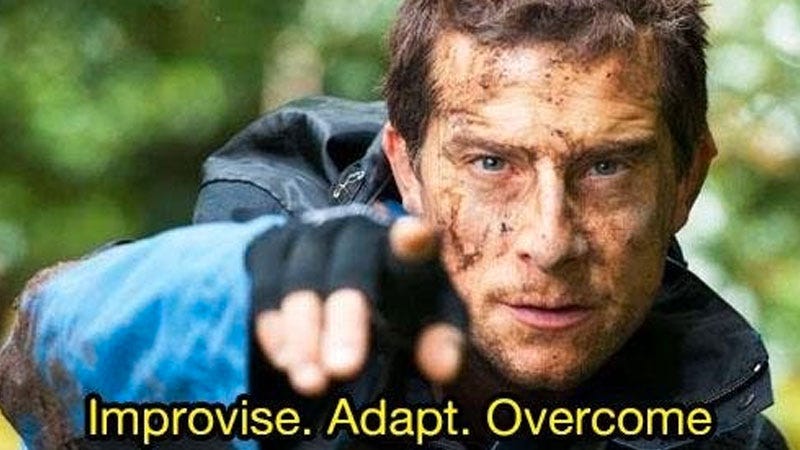There is too much entertainment today.
Films, TV (including streaming), video games, books, music…and so on. Often, some of those media are adapted from one another from the same intellectual property (“IP”) source.
Who would’ve thought we’d get a meta Barbie movie in 2023?
Transmedia Storytelling
Let’s first talk about something called transmedia storytelling.
I’ve come across this idea often in recent years, and it’s an academic concept coined by USC professor and media scholar GOAT Henry Jenkins.
Transmedia is “a process where integral elements of a fiction get dispersed systematically across multiple delivery channels for the purpose of creating a unified and coordinated entertainment experience.”
So as this appears - picture an existing successful franchise - Marvel superheroes1, Star Wars, Pokemon, Harry Potter, etc. For each of these, there’s successful films, video games, novels, comic books, TV series, fan fiction, theatre productions, and other collectible merchandise.
As a fan today, you have many options in choosing what to consume. Whether you’ve watched the Harry Potter films growing up, played the recent Hogwarts Legacy video game, played online quizzes, or visited the Universal Studios attraction, you’ve chosen to engross yourself in transmedia. All three types of media derive from the IP that was originated by author J.K. Rowling, but Warner Bros. Entertainment has the rights to the franchise/universe now titled Wizarding World of Harry Potter. In the next few years, you can expect a Max TV series as well.

According to transmedia veteran Jeff Gomez:
“Transmedia storytelling means you’re telling stories but you’re using different media in order to get the entire story… In an ideal world, that transmedia element is something that is going to enhance your experience of the narrative. It’s going to give you new insight and play to the strength of the medium.”
Now the catch here - each medium provides a different immersive experience and is complementary, not necessary for the audience engagement. If anything, the shared lore and universe transcend the original medium and is manifested across different platforms like films or TV. While I think you can fully appreciate the Wizarding World of Harry Potter universe if you’d started with the original 7 books or the 8-part films, nothing should technically undermine your experience per se if you go straight into the video game or watch the spin-off films.
If anything, I think that’s the problem at issue for the Marvel Cinematic Universe (“MCU”). There is too much mediocre content today - across both theater films and Disney+ streaming - for the general audience to dive straight into the newest medium. Further, each medium has become more of a necessity than a complement to fully understand the lore. The result? We’d just not watch Marvel films like we used to, because we have short attention spans.
So although the full transmedia storytelling experience would encourage the average consumer to indulge oneself fully in the universe, there’s definitely a limit in doing so.2
But if a media universe is able to encompass well-created content upon original IP - like Harry Potter or the MCU at least up to Avengers: Endgame — might as well keep them coming.
Challenges in Adapting Existing IP
So why do I bring up transmedia storytelling?
A lot of the new entertainment projects today capitalize on transmedia storytelling of existing IP. By focusing on the core IP - let’s say, an original fantasy book series - creators can traverse across different media to create new content. This may often come to us as a direct/loose adaptation or a spin-off, as long as it’s contained within the same universe.
I think the most linear, natural example is the live-action adaptation of visual works like comic books, cartoons, and Japanese manga/anime. There’s a certain anticipation as fans imagine a dream casting lineup of who’d play their favorite characters and whether modern CGI would be sufficient to recreate iconic scenes in reality.
Consider Netflix’s successful live-action adaptation of One Piece, originally a Japanese manga (print) initially adapted to anime (animation) first. The Netflix adaptation would go on to record 37.8 million viewers in only 2 weeks as a No.1 show acclaimed by both critics and fans for having stayed true to the heart & soul of the original series. Season 2 is on the way too.
How can the current and upcoming adaptations differ from the abominations we witnessed in the years past? Some thoughts:
Working with the original creators of the IP, either for advice or officially bringing them onboard
Generally listening to fan feedback
However, attempting to appease a subset of fans and getting swayed led to Star Wars Episode 9: The Rise of Skywalker, a critical disappointment
Creating a whole new original storyline in the zeitgeist
OR, staying true and dedicated to the original story and spirit
Director/producers/talent be actual fans of the original. If not, an active stance to understand would help.
The director of the mega-panned Dragonball Evolution (2009) didn’t know much about the original series when he signed on…
Let’s be real. Plenty of social media warriors argue that they could do a better job of writing and casting than professionals. While we’d never really know, here’s what James Gunn (Co-CEO of DC Studios, director of Guardians of the Galaxy series) opined on casting specifically:
So from a creator’s POV, Gunn wants to focus on a quality script first and that’s how it should be. I suppose we can always hold back on criticizing until after watching something, right?
That being said, with the abundance of entertainment content today already — all of which can be IP monetization — I’m not sure if every existing franchise really needs a film, a limited TV series, video game, stage play, and so on.
Personally, I don’t desire to see a live-action Digimon film nor do we need one. But we know many live-action adaptations of beloved franchises are coming - Avatar: The Last Airbender, Yu Yu Hakusho, Legend of Zelda, and Naruto - to name a few.
Please don’t disappoint the fans!
The IP Gold Mine
If we’re building this universe with so much entertainment content today, where should we look to?
Experts say that the IP gold mine is in video gaming. For starters, the gaming industry is bigger than music and movies combined. The global gaming market was valued at $159.3 billion in 2020, against music’s $19.1B and movies’ $41.7B.
Also, 212.6 million Americans play video games at least 1 hour per week - that’s 65% of Americans.
When I interned in the gaming industry, I was astounded by how vast the difference was. Now, think of all the IP that either originates in gaming or has been made into a video game.3 Conversely, a lot of well known films and shows have been made into video games for a long time. We can reach so many more audiences! While I don’t think all games should be turned into live-action films or spin-off comic books and vice versa, I doubt that’s going to stop the people in charge.
The point is that if you’ve only considered the more “traditional” forms like films, TV shows, and books, I’ll let you meditate on the gaming industry a bit before I dissect it further on its own down the road.
If you enjoyed this, I’d love to hear from you on what topics you’d like to read about.
For the time being, I’ll categorize posts like these as “multimedia”, as this could range from any IP that encompasses films, TV, gaming, and the like.
I realize I wrote a bit on K-pop/K-content during the past few years and although there’s a finalized post ready to go, I did not want it to shape the initial direction of my Substack. There are many K-pop-focused writers already, so I hope to provide a different perspective. Stay tuned for that as well.
See you soon!
-Wooseok Ki (Wooski)
Well, at least up to Avengers: Endgame and a few selected films after. The Marvel Cinematic Universe isn’t doing too well as of November 2023,
Aside from too much transmedia content, there’s multiple reasons and theories as to why the newer Marvel shows don’t deliver as they used to. But Marvel is clearly aware.
Recent years we’ve seen quite a few good examples - Sonic the Hedgehog, Mortal Kombat, Uncharted, Arcane, The Last of Us, Super Mario Bros. Movie, etc.







